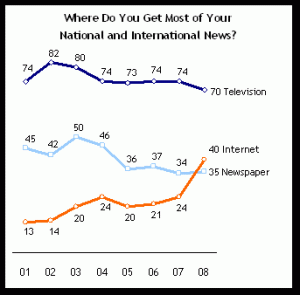 Last month we told you about new Gallup research that showed the Internet is fast closing the gap with local newspapers as the number one news source in the US. Now Pew Research says the lines have crossed. The survey of 1,489 adults found that 40% said they get most of their national and international news online, compared with 35% who rely primarily on newspapers. Television continues to the number one choice, at 70%. Among people under 30, however, the Internet is now just as popular as television for news. In fact, among that age group, the Internet’s role as a primary news source jumped from 34% to 59% in just 15 months, a leap that suggests that these results might be an aberration. We’ll know soon. Pew conducts the survey roughly once a year. There’s also information about the top news stories of 2008, a list dominated by economic issues.
Last month we told you about new Gallup research that showed the Internet is fast closing the gap with local newspapers as the number one news source in the US. Now Pew Research says the lines have crossed. The survey of 1,489 adults found that 40% said they get most of their national and international news online, compared with 35% who rely primarily on newspapers. Television continues to the number one choice, at 70%. Among people under 30, however, the Internet is now just as popular as television for news. In fact, among that age group, the Internet’s role as a primary news source jumped from 34% to 59% in just 15 months, a leap that suggests that these results might be an aberration. We’ll know soon. Pew conducts the survey roughly once a year. There’s also information about the top news stories of 2008, a list dominated by economic issues.
A Public Utility
Should newspapers get a government bailout? One Connecticut lawmaker says yes. Frank Nicastro of Connecticut’s 79th Assembly district is worried that Journal Register Co. will carry out its threats to shutter the Bristol Press and he’s asking the state for loans, tax breaks or anything else that will save the daily. The Press reportedly has just 11 days to live.
Nicastro’s campaign has fueled an ongoing debate over whether newspapers are entitled to the same government support as airlines, banks and the automobile industry have received. Some people say newspapers are an essential public utility that a democracy can’t afford to lose. Others think the market will find a way to provide this service one way or the other. Almost everyone admits there’s a conflict-of-interest question when a government funds its own watchdog, kind of like letting the banking industry regulate itself. We have an opinion, but we’d like to hear yours, so we made this into a poll question. Cast your vote in the sidebar widget to the right.
A Different Kind of Death Watch
“My beat at The Globe and Mail is the dead,” writes Sandra Martin, in a quote that already goes on our short list for best of 2009. That’s only one of many good lines in her superbly written piece on the craft of obituary writing, one of the least understood and most often satirized disciplines in journalism.
Martin is the Toronto Globe and Mail‘s chief obituary writer and she really, really likes the job. So do a few hundred other people who make up the Society of Professional Obituary Writers (SPOW) (“The first time I Googled the society’s acronym, I came up with ‘sex position of the week,'” Martin comments in another of the 3,700-word essay’s good lines). This fun and fact-filled feature touches on some of the profession’s stickier issues, such as how to balance facts about the deceased’s sexual escapades with the need to avoid angering grieving relatives or how to tell a person you’re interviewing them for their own obituary. She also describes the nightmare all obituarists face: what to do when someone dies suddenly and you’ve got nothing prepared on them.
Martin’s words are relevant to the topic of newspaper survival. She cites Northwestern University research that found that obits were “important” to 45 per cent of readers and “very important” to an additional 12 per cent. That wouldn’t surprise the people at Eons, a social network for baby boomers. They discovered that death notices quickly became the most popular features on their site, which is why they launched Tributes.
Obituary writing isn’t morbid, Martin notes. Rather, it is “about life; death is merely the occasion to set the subject into context.” Read this delightful story and you’ll probably agree that this beat has plenty of, er, life to it.
Miscellany
The Kansas City Kansan will end an 87-year print run on Wednesday when it ceases twice-weekly publication and goes online-only. The Kansan was once the only daily newspaper serving Kansas City, Kan. The revamped website will invite lots of reader contributions through photo-sharing and blogs. Half the staff will be cut. That’s four people. (via Todd Epp).
“Newspaper stocks fell an average of 83.3% in 2008 – twice the fall of the S&P 500 – wiping out $64.5 billion in market value, according to Alan Mutter’s Newsosaur blog.” Want more stats like that? Jeff Jarvis has assembled a few and is asking for more contributions.
John Schrag of the Forest Grove (Ore.) News-Times resists the urge to wring his hands and instead gives specifics on how staff cutbacks are affecting city-hall reporting. This column manages to be both opinionated and dispassionate, documenting with examples how citizens are less informed about their government because reporters aren’t there to sit through the boring meetings. Bloggers, Schrag writes, “may show up in Salem, but I doubt they’ll be posting reports about the Banks Budget Committee or the county’s Joint Watershed Commission.” True that.
Editor & Publisher‘s Mark Fitzgerald lists his choices for the top 10 industry quotes of 2008. Many relate to the stocks of major companies becoming worthless. And Christopher Wink posts some gems in his Twelve months of top journalism blog posts in 2008.
Terrible financial results barely merit a mention any more, other than the fact that each month or quarter seems to be worse than the one just preceding it. Media Post reports ad revenues fell 22.4% at McClatchy in November and publishing revenues were down 17.9% at Media General. The sole bright spot: online revenue was up over 7% at both companies.
Swift Communications has cut staff at its Western Slope newspapers in Colorado and closed some weekly papers. Unspecified cutbacks were made at the Glenwood Springs Post Independent, Aspen Times and Grand Junction Free Press. The company shuttered the weekly Carbondale Valley Journal, Leadville Chronicle and the Spanish-language La Tribuna based in Glenwood Springs.
And Finally…
Here are the results of our recent query about the drama in Detroit. Thanks to everyone who voted. We’re trying out a new polling app in the sidebar to the right and will keep plugging away till we find one that we like. Suggestions are welcome:

Note: An earlier version of this story was erroneously headlined “Survey Says Web is #1 News Source.” A reader pointed out that television still holds the top spot.
Comments
This entry was posted on Monday, January 5th, 2009 at 10:15 am and is filed under Facebook, Google, Hyper-local, Solutions. You can follow any responses to this entry through the RSS 2.0 feed. Both comments and pings are currently closed.



Actually, the survey says that Television is the No. 1 source of news.
The news in the survey is that the ‘net has moved above newspapers.
[…] I am a source for a story on the demise of the print edition of the Kansas City Kansan. […]
“Should newspapers get a government bailout? One Connecticut lawmaker says yes. Frank Nicastro of Connecticut’s 79th Assembly district is worried that Journal Register Co. will carry out its threats to shutter the Bristol Press and he’s asking the state for loans, tax breaks or anything else that will save the daily.”
This statement is false. Nicastro simply asked Connecticut’s head of economic development to help find a buyer for these two newspapers. You can call that a “bail out” if that is your desire, but Nicastro did not do anything extraordinary to request loans or money or tax breaks to save any newspapers. He simply asked the state to do what it could to help. If you want to call that meddling by the state into the affairs of the church, well, it’s your “deathwatch’ so you can pretty much distort the facts any way it suits your websites point of view.
I never called it a bailout in my story. I said government aid for a reason. I also never said it was what Nicastro was calling for. Either way, those CT papers found a buyer so there we are.
Thanks for running this site – it’s ghoulish fun.
Robert MacMillan
Reuters
I plead guilty to poetic license in using the term “bailout.” Robert MacMillan never said that. I think the real story is the bigger issue of government aid for the industry, no matter what form it takes. I hope that still came across. Thanks for your comments.
[…] day. The iPhone became the first mobile phone to be used more for data than for voice. The Internet became the second most popular news medium behind television. Wikipedia posted its three millionth […]
[…] day. The iPhone became the first mobile phone to be used more for data than for voice. The Internet became the second most popular news medium behind television. Wikipedia posted its three millionth […]
[…] day. The iPhone became the first mobile phone to be used more for data than for voice. The Internet became the second most popular news medium behind television. Wikipedia posted its three millionth […]
[…] NewspaperDeathWatchSurvey Copyright […]